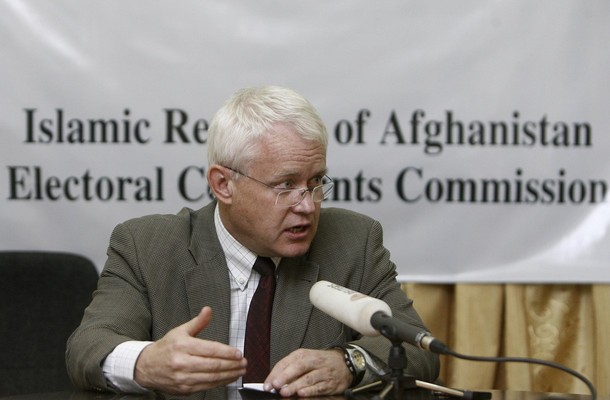Afghanistan Run-off Ordered
 Well, the UN-backed Electoral Complaints Commission has said that a third of the counted votes in the Afghanistan election were fraudulent and ordered a run-off between Hamid Karzai and second place finisher Abdullah Abdullah. Karzai looks unlikely to comply and nobody really wants a run-off, anyway.
Well, the UN-backed Electoral Complaints Commission has said that a third of the counted votes in the Afghanistan election were fraudulent and ordered a run-off between Hamid Karzai and second place finisher Abdullah Abdullah. Karzai looks unlikely to comply and nobody really wants a run-off, anyway.
So, as I write in my New Atlanticist essay, “Afghanistan Election: Now What?” we’re left with some rather unpleasant alternatives. If Karzai tells the commission to go to Hell and declares himself the winner, we’re in trouble. If we have a run-off, we’re likely not going to have this resolved until next winter.
Politico‘s Laura Rosen and others have said an arrangement is being worked out to allow Karzai to keep the presidency with Abdullah getting a significant portfolio. And, surely, the denial by both sides that this is happening can not be considered dispositive.
Further, as [WSJ’s Gerald Seib] points out, “it’s also possible all this agonizing over the election matters more to outsiders than it does to Afghans. “ Not only is the central government less important in their daily lives that it seems from outside but, frankly, they’re not used to Western style democracy and may be willing to accept a few points of corruption as close enough. Especially since Karzai’s likely to win a two-way race, anyway.
But the United States and its NATO allies, already facing declining domestic support for the war, needs to have at least the illusion of legitimacy to work with here. Considering the bad alternatives on the table, a deal between Karzai and Abdullah, with a speech by the latter urging his supporters to back the new coalition government, may be the best outcome.
Bad options seem to be all we have these days.
I think that Turki al-Faisal’s advice, which I posted last week, to the effect that Karzai is a fact that we need adapt to rather than dwell on his shortcomings is probably prudent.
Dave, you mean the Saudis don’t value the democratic process?
I feel a little stuck here. This quote gives me pause:
The UN didn’t report it’s results, but that’s damn close for an election that could never be entirely clear to begin with. My preference is for Karzai to hold the re-election, which he would probably win and would strengthen his legitimacy. While I think the U.S. will have to deal with Karzai regardless, I think we should spend less time worrying about undermining him by concentrating our relations with local leaders in Pashtunistan.
From the Democracy International website, it appears that the 48.29 percent figure might be its opinion of what the ECC found. Dr. Abdullah Abdullah was second with 31.54 percent. I personally think a re-vote with these types of numbers is a waste of time. I’d rather see them where the top vote-getter fails to receive 40% of the vote or where the second and third placed finishers receive more than half the votes together.
That’s not the rules here of course, but I certainly wouldn’t go to war for the two percent of the voters that thought a vote for Ralph Nader would be a stick-in-the-eye to the system. Nor do the ECC audit provisions appear to meet Al Franken levels of scrutiny: “There are a number of methodological problems with this approach, but it was chosen to allow the IEC and ECC to conduct the audit relatively quickly.”